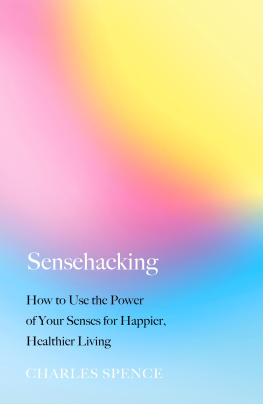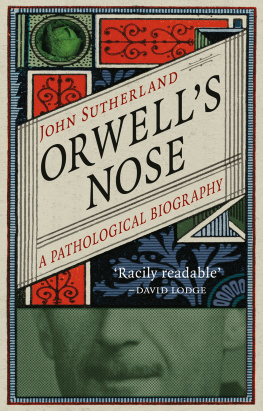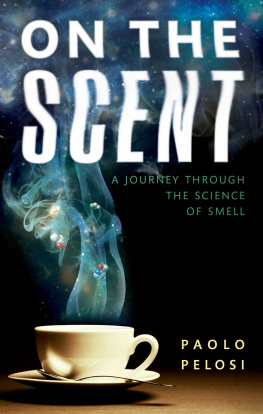Avery Gilbert - What the Nose Knows: The Science of Scent in Everyday Life
Here you can read online Avery Gilbert - What the Nose Knows: The Science of Scent in Everyday Life full text of the book (entire story) in english for free. Download pdf and epub, get meaning, cover and reviews about this ebook. year: 2008, publisher: Crown, genre: Romance novel. Description of the work, (preface) as well as reviews are available. Best literature library LitArk.com created for fans of good reading and offers a wide selection of genres:
Romance novel
Science fiction
Adventure
Detective
Science
History
Home and family
Prose
Art
Politics
Computer
Non-fiction
Religion
Business
Children
Humor
Choose a favorite category and find really read worthwhile books. Enjoy immersion in the world of imagination, feel the emotions of the characters or learn something new for yourself, make an fascinating discovery.

- Book:What the Nose Knows: The Science of Scent in Everyday Life
- Author:
- Publisher:Crown
- Genre:
- Year:2008
- Rating:4 / 5
- Favourites:Add to favourites
- Your mark:
- 80
- 1
- 2
- 3
- 4
- 5
What the Nose Knows: The Science of Scent in Everyday Life: summary, description and annotation
We offer to read an annotation, description, summary or preface (depends on what the author of the book "What the Nose Knows: The Science of Scent in Everyday Life" wrote himself). If you haven't found the necessary information about the book — write in the comments, we will try to find it.
Avery Gilbert: author's other books
Who wrote What the Nose Knows: The Science of Scent in Everyday Life? Find out the surname, the name of the author of the book and a list of all author's works by series.
What the Nose Knows: The Science of Scent in Everyday Life — read online for free the complete book (whole text) full work
Below is the text of the book, divided by pages. System saving the place of the last page read, allows you to conveniently read the book "What the Nose Knows: The Science of Scent in Everyday Life" online for free, without having to search again every time where you left off. Put a bookmark, and you can go to the page where you finished reading at any time.
Font size:
Interval:
Bookmark:
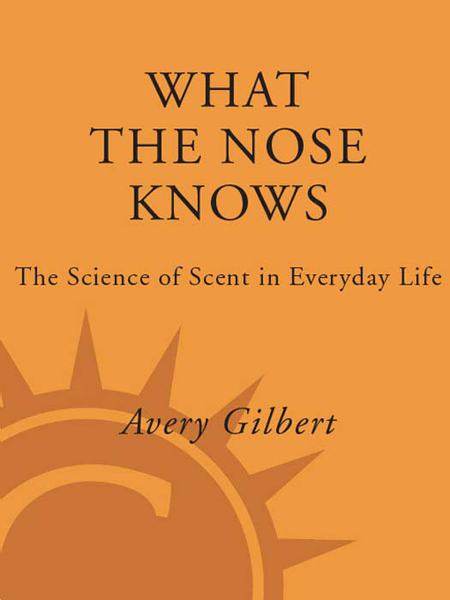
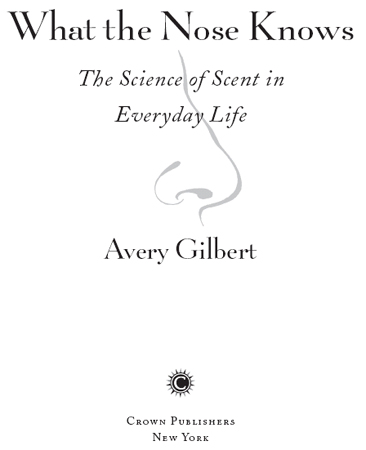
Contents
CHAPTER 1 Odors in the Mind
Making sense of scents
CHAPTER 2 The Molecules That Matter
The key ingredients of natures chemistry set
CHAPTER 3 Freaks, Geeks, and Prodigies
The wide range of olfactory ability
CHAPTER 4 The Art of the Sniff
How the brain edits what the nose detects
CHAPTER 5 A Nose for the Mouth
Cooking, eating, and evolution
CHAPTER 6 The Malevolence of Malodor
When bad smells happen to good people
CHAPTER 7 The Olfactory Imagination
Smell and creative genius
CHAPTER 8 Hollywood Psychophysics
Scent and cinema
CHAPTER 9 Zombies at the Mall
Leading consumers by the nose
CHAPTER 10 Recovered Memories
Prousts soggy madeleine
CHAPTER 11 The Smell Museum
Preserving odors from the past
CHAPTER 12 Our Olfactory Destiny
The future of smelling
To Susie
If you are ambitious to found a new science, measure a smell.
ALEXANDER GRAHAM BELL, 1914
Theyve injected us! Were off on our fantastic journey through the human body!
Just think! In less than one minute, we have a rendezvous with our olfactory destiny!
Isnt that a rather pretentious statement, Doctor?
All right! YOU think of a more romantic way to say were going up a nose!
FANTASTECCH VOYAGE, Mad Magazine, 1967
Introduction
BEING A SMELL EXPERT has its ups and downs. In my professional life Ive attended secret perfume planning meetings in corporate suites with spectacular views of Central Park. But Ive also sat at a conference table and sniffed defrosted samples of used feminine hygiene products.
Ive traveled to London, Zrich, Paris, and Cannes, staying at the best hotels and eating at the finest restaurants. Ive also traveled to Cape Girardeau, Missouri, to evaluate the scent of carefully aged cat feces.
I have air-kissed fashion celebrities and sniffed the scalps of elderly ladies being shampooed in a mock salon.
I was among the first people to smell Elizabeth Taylors White Diamonds, but also one of the first to sniff purified 3-methyl-2-hexenoic acidthe aromatic essence of ripe, unwashed armpits.
These experiences are not unusual in the fragrance industry: people there sniff for a living and create scents for everything from perfume to kitty litter. What is unusual is that Im a sensory psychologist, trained in evolutionary theory, animal behavior, and neuroscience. Im a rational, evidence-based guy working in the most frothy, fashion-driven, marketing-heavy business outside of Hollywood.
The sense of smell portrayed in the mainstream media (Seven Ways to Drive Him Wild with Your Perfume!) is far different from the way scientists see it (Multivariate Analysis of Odorant-Induced Neural Activity in the Anterior Piriform Cortex). The magazine versionbreezy and chattysails merrily past new discoveries just emerging from the laboratory. The official scientific versionformal, dense, and dryhides some very cool new stories.
I know people are fascinated by the hows and whys of odor perception. When they find out Im an expert, they bombard me with questions. The answers are often weirder than they could have imagined. The new science of smell is making us rethink everything from wine tasting to Smell-O-Vision. So its time for a fresh look at odor perception and how it plays out in popular culture.
Where to begin? With a simple question: How many smells are there? The answer leads to psychology (How do you count smells?), technology (How do you take apart a complex odor?), and secrets of the trade (How do you become a perfumer?).
In the chapters that follow, I take up other simple questionsWhat makes for a good sense of smell? Do bad odors make us sick? Can subliminal smells make us do things against our will?and follow them to some strange and unexpected places. Welcome to my world. Breathe deep and enjoy.
CHAPTER 1
Odors in the Mind
It is very obvious that we have very many different kinds of smells, all the way from the odor of violets and roses up to asafetida. But until you can measure their likenesses and differences you can have no science of odor.
ALEXANDER GRAHAM BELL, 1914
No satisfactory classification of odours can be given.
Encyclopaedia Britannica, 1911
H OW MANY SMELLS ARE THERE? ITS AN ODD QUESTION, but give it some thought. Mentally flip through the pages of your personal smell catalog. You find burnt toast, shaving cream, Grandmas kitchen, and pine trees. Theres the weird glue in the binding of that pocket-size Latin/English dictionary from high school. With a little effort you can come up with a lot of smells, but putting a number to them is difficult. How does one count the odors of a lifetime, much less all the odors in the world?
Some people arent daunted by the task: they simply estimate. Better yet, they pass along estimates made by others. Journalists like to say that we can smell thirty thousand different odors. The New Age guru Michael Murphy cites this figure in The Future of the Body (1992): According to the calculations of one [fragrance] manufacturer, an expert can distinguish more than 30,000 nuances of scent. Murphy, in turn, got the number from Vitus Drscher, a German pop science writer (1969): A perfume manufacturer has worked out that a real expert must distinguish at least thirty thousand nuances of scent. Drscher doesnt provide a source. Perhaps it was in Science Digest (1966): Industrial chemists have identified some 30,000 different smells. Unfortunately, the magazine didnt provide a source either. What this proves, I suppose, is that dubious facts thrived in the media long before the Internet.
One would like to think that smell scientists have a better grasp of the matter, and indeed they prefer to quote a different estimate. When Linda Buck and Richard Axel won the 2004 Nobel Prize for discovering the olfactory receptors, the Nobel Foundation issued a press release. It noted that people recognize and remember about 10,000 different odours, a figure the Swedish publicists took from the prize winners themselves. Surely thats a number we can take to the bank. But the number 10,000 didnt originate with Buck and Axel: it had been tossed about for years by other scientists. Something about it had always bothered mewhy such a nice fat round number? Why was there no date of discovery? And, strangest of all, why did nobody take credit for it?
If you try to track down the mysterious number 10,000 to its original source in the scientific literature, you are in for an adventure; like walking a maze, dead ends abound. For example, I began with a paper in Behavioral Ecology (2001), which I followed to another in Trends in Genetics (1999), which in turn didnt provide a source. I started again, this time with a prominent smell researcher, the Brown University psychologist Trygg Engen. In 1982 he wrote, Some have claimed that an untrained person can identify by label at least 2,000 odors and an expert can identify as many as 10,000. Engen credits this claim to R. H. Wright, Canadas most famous smell scientist. Wright seemed a likely source, at least until I read what he actually wrote, back in 1964: [I]t seems likely that the average person would have no trouble in distinguishing between several thousand odours, and an experienced authority in the field has claimed the ability to recognize well over ten thousand. Still another has simply said the number is apparently unlimited. Wright goes on to say, It would be an interesting exercise to design an experiment to verify these estimates. Ooof! So Wright didnt discover any number at allhe just passed along what he had heard and Professor Engen repeated it. These eminent smell experts remind me of kids at summer camp passing along ghost stories.
Next pageFont size:
Interval:
Bookmark:
Similar books «What the Nose Knows: The Science of Scent in Everyday Life»
Look at similar books to What the Nose Knows: The Science of Scent in Everyday Life. We have selected literature similar in name and meaning in the hope of providing readers with more options to find new, interesting, not yet read works.
Discussion, reviews of the book What the Nose Knows: The Science of Scent in Everyday Life and just readers' own opinions. Leave your comments, write what you think about the work, its meaning or the main characters. Specify what exactly you liked and what you didn't like, and why you think so.



